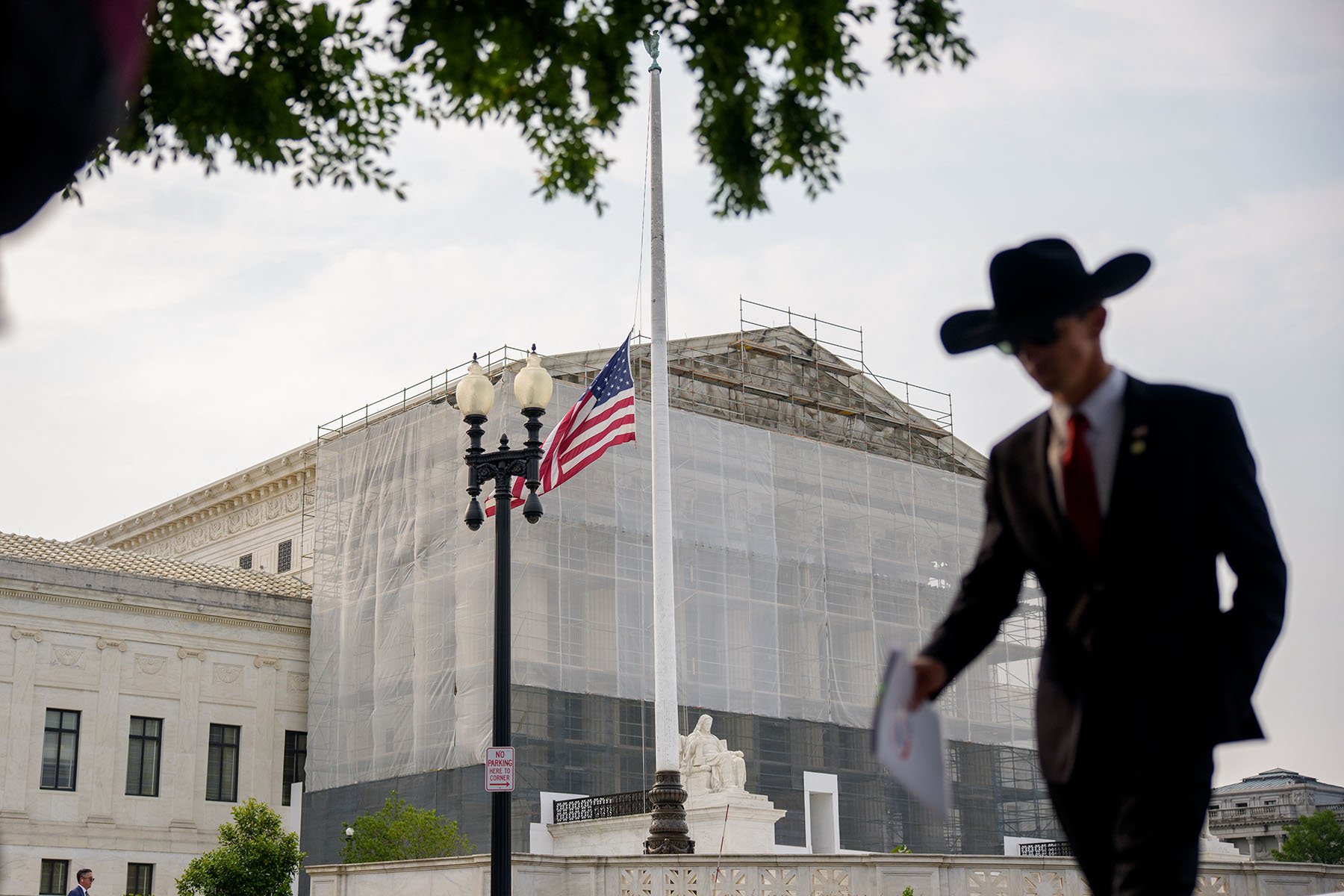The Supreme Court ruled 6-3 Friday that age verification “porn ID” laws are an appropriate way to regulate content for minors without infringing on the First Amendment rights of adults.
The ruling, in Free Speech Coalition v. Paxton, has major implications for the accessibility of any online speech the government could decide is harmful to children.
Laws that potentially curb civil liberties are subject to rigorous legal standards. Two lower courts had applied different standards to the Texas law, and the Supreme Court decided that the 5th U.S. Circuit Court of Appeals’ lower standard was correct in this case. Strict scrutiny, the standard applied by the Texas district court, requires that a law must be narrowly tailored, further a compelling government interest and be the least restrictive option. The 5th Circuit used a lower standard, known as rational basis, to evaluate the law, essentially saying it has no potential to jeopardize freedom of speech.
The Free Speech Coalition joined several adult content companies and an anonymous creator to challenge Texas’ law. The organization has filed cases in different states challenging web-based age verification statutes over the past couple years. According to the organization’s tracker, 24 states have passed age verification laws targeting sexual content online since 2022.
Writing for the majority, Justice Clarence Thomas held that the law should be evaluated based on intermediate scrutiny, the standard in between, because it only “incidentally burdens the protected speech of adults.” Laws must further an important government interest and do so by “means substantially related to that interest.” Texas’ law survives this test, Thomas wrote. Justice Elena Kagan, joined by Justices Sonia Sotomayor and Ketanji Brown Jackson, dissented.
Thomas dismissed the argument about the risks of age verification in an online environment, contending that websites or third-party services “have every incentive to assure users of their privacy.” He also held that accessing pornography has always come with a stigma, sidestepping the way digital information on users is collected, bought and sold in today’s world.
He noted that under intermediate scrutiny, the law doesn’t have to address all aspects of the overarching problem of blocking children from seeing inappropriate material online. Representatives of the pornography industry had argued that Texas’s law exempted the places on the internet youth are most likely to encounter content considered obscene for them: social media and search engines.
“This is a major victory for children, parents, and the ability of states to protect minors from the damaging effects of online pornography,” Texas state Attorney General Ken Paxton said in a statement. “Companies have no right to expose children to pornography and must institute reasonable age verification measures.”
In her dissent, Justice Kagan argued that Texas’ law regulated content and thus should be subject to strict scrutiny. She asked whether the age verification process outlined was the least restrictive way to keep access for adults while also preventing children from seeing sexual material online.
She emphasized the risks to privacy that the Free Speech Coalition and digital civil rights groups raised in their arguments.
“It is turning over information about yourself and your viewing habits—respecting speech many find repulsive—to a website operator, and then to…who knows?” she wrote. “The operator might sell the information; the operator might be hacked or subpoenaed.”
Kagan also drew a distinction between online age verification and flashing an ID momentarily in person: “The internet context can only increase the fear.”
By saying the law does not have to meet strict scrutiny, the opinion paves the legal way for increased site-based age verification on the web. The privacy concerns accompanying the uploading of verifiable identification to sensitive websites are not seen as overly burdensome to adults.
Consequently, the court ruled restrictions on protected free speech for adults can be applied in the name of protecting children.
In 2023, Texas passed a law requiring websites with at least one-third sexual content — characterized as “material harmful to minors” — to verify the age of users using government identification or other reliable techniques. The law was initially blocked by a district judge, but then the preliminary injunction was overruled by the 5th U.S. Circuit Court of Appeals. The law has been in effect while the Supreme Court considered the case.
Many digital civil rights groups have raised the alarm over privacy risks of web-based age verification. Texas, like the majority of states, does not have a state-recognized digital identification system. Websites would need to contract with a third- party company that handles photos of physical IDs or runs face-scans to determine the age of users. The risk is compounded as a user typically must verify their age every time they try to view a page. Device-based age verification, where pieces of technology like phones or computers are age-locked, generally only requires identification once.
“The government should not have the right to demand that we sacrifice our privacy and security to use the internet,” said Alison Boden, executive director of the Free Speech Coalition, the adult industry trade group who sued Texas over its age verification law. “This law has failed to keep minors away from sexual content yet continues to have a massive chilling effect on adults. The outcome is disastrous for Texans and for anyone who cares about freedom of speech and privacy online.”
The decision doesn’t mean all forms of age verification are now legal online, said Vera Eidelman, senior staff attorney with the ACLU Speech, Privacy and Technology Project, who joined as co-counsel on the case. Rather, “with this decision, the court has carved out an unprincipled pornography exception to the First Amendment.”
These laws have severely reduced traffic to pornography sites that have complied with age verification mandates, but they haven’t stymied consumption of sexual material. They are more likely to drive users to less-moderated sites that host illegal material like child sexual abuse material. Adult content creators, many who are women and LGBTQ+, depend on traffic referrals from free “tube” sites like Pornhub to funnel into paid channels. The impacts of these laws will trickle down to people who make legal, constitutionally protected content for adults.
Critics of age verification laws worry how state governments will determine what kinds of content qualify as “harmful to minors,” especially as censorship of LGBTQ+ media rises under the mantle of being inappropriate for children — or outright consider the existence of queer people to be pornographic. The ability to easily access information about reproductive health or dissenting political opinions could be targeted by laws championing children down the line.
And in a world where data leaks are an everyday occurance, there could be serious reputational harm caused to people whose personal information could be linked to viewing porn — or specific types of porn, like LGBTQ+ content, even though age verification vendors aren’t supposed to track that. (Many companies track and share data even if they claim not to.)





